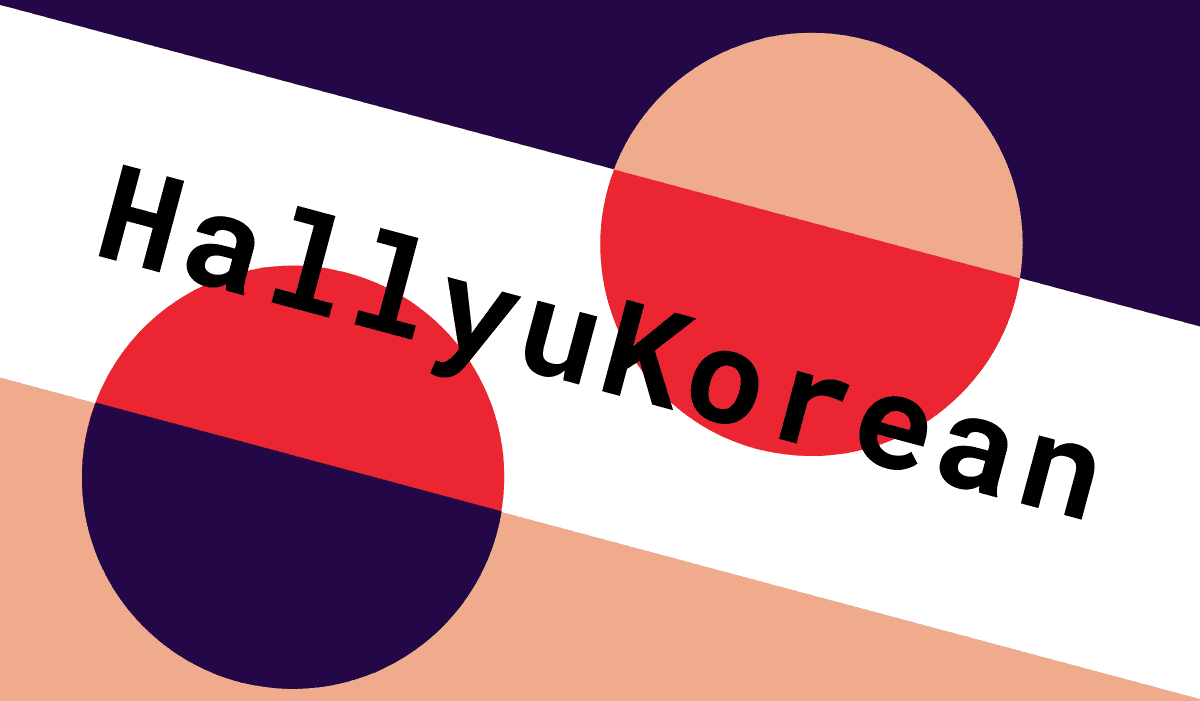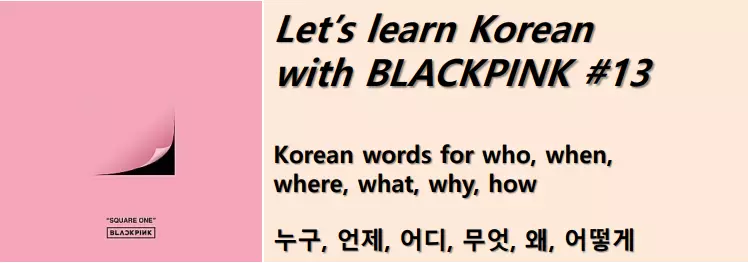Korean words for who, when, where, what, why, how : 누구, 언제, 어디, 무엇, 왜, 어떻게
Question Words in Korean
Let’s learn Korean words for who, when, where, what, why, how with BLACKPINK lyrics.
Click the play button below to listen to all the BLACKPINK lyrics used in this post.
누구 [nu-gu] who
잠깐 누가 시간을 좀 멈춰봐
jam-kkan nu-ga si-ga-neul jom meom-chwo-bwa
Somebody stop time for a second
[Can someone stop time for a moment?]
*잠깐(for a moment) +
누가(누구(who) + 가(subject particle), =누가) +
시간(time) + 을(object particle) +
좀(please) +
멈춰봐(멈추다(stop) + ~어보다(try ~ing))
(*~아/어/해 보다 is mainly used to talk about past experiences and to try something out.)
언제 [eon-je] when
브레이크 댄스는 언제부터 배우기 시작했어요?
beu-re-i-keu daen-seu-neun eon-je-bu-teo bae-u-gi si-jak-hae-sseo-yo?
When did you start learning to break dance?
*브레이크 댄스(break dance) + 는(topic particle) +
언제(when) + 부터(from) +
배우기(배우다(learn) + ~기)) +
시작했어요?(시작(start) + 했어요?(did?))
(*Adding ~기 to a verb stem makes the verb a noun.)
어디 [eo-di] where
매일 뭐 해? 어디야? 밥은? 잘 자
mae-il mwo hae? eo-di-ya? ba-beun? jal ja
What are you up to? Where are you? Did you eat? Goodnight
*매일(everyday) +
뭐(what) +
해? (do?) +
어디야? (where are you?)
밥(meal) + 은?(topic particle) +
잘(well) + 자(sleep)
무엇 [mu-eot] what
세상 무엇도 두렵지 않아
se-sang mu-eot-do du-ryeop-ji a-na
I’m not afraid of anything in the world
*세상(world) +
무엇(what) + 도(too) +
두렵지 않아(두렵다(be afraid) + ~지 않다(don’t))
(*This sentence has no subject.
It’s important to note that while English sentences require a subject, Korean sentences often omit the subject.
The omitted subject can be identified in the context of the dialogue or writing.)
뭐 [mwo] what
이게 뭐야?
i-ge mwo-ya?
What is this?
*이게(이(this) + 것(thing) + 이(subject particle), =이게) +
뭐야?(뭐(what) + 이야?(be?))
(*뭐 is the shortened form of 무엇. 무엇 is a noun and 뭐 is an adverb or a noun.
무슨 also means ‘what’, but it’s an adjective, so you can use it if you have a noun after it.)
왜 [wae] why
왜 그런지 모르겠어요
wae geu-reon-ji mo-reu-ge-sseo-yo
I don’t know why
*왜(why) +
그런지(그렇다(be so)+ ㄴ지(connective ending), =그런지) +
모르겠어요(don’t know)
(*This sentence also has no subject.
It’s important to note that while English sentences require a subject, Korean sentences often omit the subject.
The omitted subject can be identified in the context of the dialogue or writing.
ㄴ지 is a connective ending used to indicate an ambiguous reason or judgment about the following statement.)
어떻게 [eo-tteot-ke] how
어떻게 이렇게 모든 게 벅차기만 해?
eo-tteo-ke i-reo-ke mo-deun ge beok-cha-gi-man hae?
How can everything be so overwhelming?
*어떻게(how) +
이렇게(like this) +
모든(every) +
게(것(thing) + 이(subject particle), =게)
벅차기만(벅차다(be beyond one’s power) + ~기 +만(only)) +
해(do)
(*Adding ~기 to a verb stem makes the verb a noun.)
Grammar Reference
The most common Korean particles are listed below.
Subject particle: 이 / 가
Topic particle: 은 / 는
Object particle: 을 / 를
이, 은, 을 for nouns ending with a consonant, 가, 는, 를 for nouns ending with a vowel.
누구, 언제, 어디, 무엇, 뭐 can also be combined with common Korean particles.
| 이/가 | 은/는 | 을/를 | |
| 누구 | 누가 | 누구는(=누군) | 누구를(=누굴) |
| 언제 | 언제가 | 언제는 | 언제를 |
| 어디 | 어디가 | 어디는 | 어디를 |
| 무엇 | 무엇이 | 무엇은 | 무엇을 |
| 뭐 | 뭐가 | 뭐는 | 뭣을 |
BLACKPINK music video to enjoy
Well done for making it this far.
Watch the SOLO music video above and see if you can hear “매일 뭐 해? 어디야? 밥은? 잘 자”, which you learned today.


